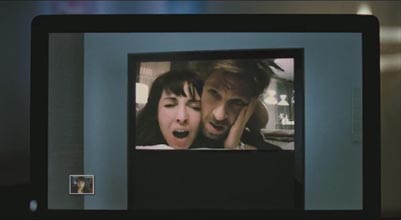POWERFUL EMOTIONAL IMAGES, AND "THE BEAUTY OF THE ELONGATED MOMENT"
 Film & Leven's Gawie Keyser posted a review of Brian De Palma's Passion yesterday, calling the story "flat as a dime, not to mention implausible, poorly developed and sometimes very badly played by actors who seem like amateurs." But then Keyser goes on to suggest that none of that matters:
Film & Leven's Gawie Keyser posted a review of Brian De Palma's Passion yesterday, calling the story "flat as a dime, not to mention implausible, poorly developed and sometimes very badly played by actors who seem like amateurs." But then Keyser goes on to suggest that none of that matters:"But this is film and not a novel or theater, something that De Palma is well aware of and a point on which he insists in interviews. Film is image, as a matter of fact, and there are few directors better than De Palma at understanding that it is the drama of images, rather than the meaning of the words of characters, that has a psychological impact. That’s why Passion is so powerful: the film does not appeal to rational thought processes, but seems to stimulate the emotions that regulate those parts in your brain. It is a film in which texture predominates: images reflected within images or on shiny surfaces such as mirrors and walls and windows in ultra modern office buildings or in anonymous apartments that cause feelings of alienation rather than homeliness. Everything is extremely stylized, so time is distorted and the essence of an action or event is stretched and accentuated, especially in a fabulous sequence where a bloody murder and a ballet performance are simultaneously visible in split screen...
"...De Palma is a romantic filmmaker par excellence, and that he has in common with his Hong Kong colleague Wong Kar-wai. Perhaps the problem lies in something they both contend with when it comes to the reception of their work: the harsh reality of the current zeitgeist offers little room for the beauty of the elongated moment."
Updated: Tuesday, April 30, 2013 1:27 AM CDT
Post Comment | Permalink | Share This Post



